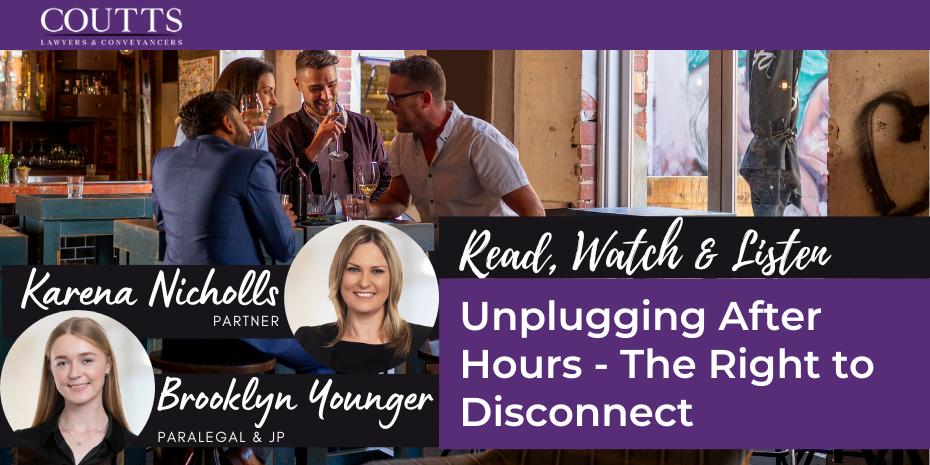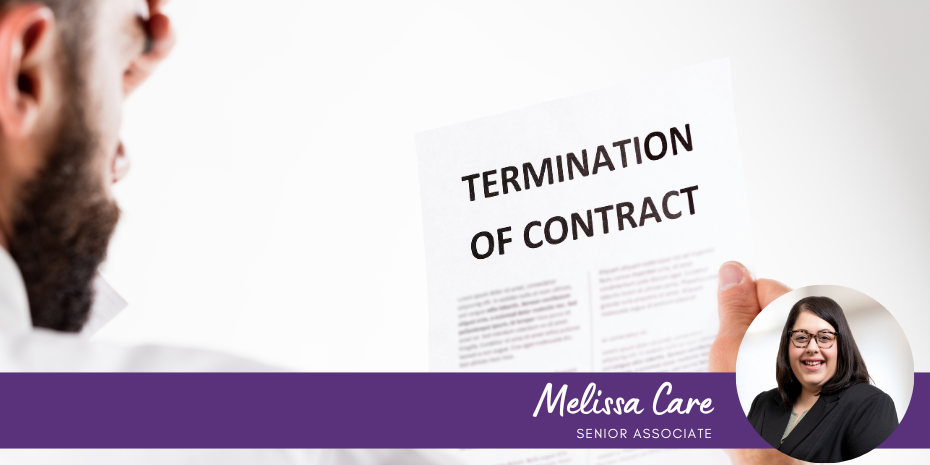Co-authored by: Brooklyn Younger
KEY TAKE OUTS:
- The new legislation that prevents Employers from contacting their Employees outside of work hours.
- This allows Employees to refuse to monitor and refuse to respond to all work-related contact outside of work hours.
Introduction
The Right to Disconnect has been added as an amendment to the Fair Work Act under the Fair Work Legislation Amendment (Closing Loopholes No. 2) Bill 2023 and is set to take effect in approximately 5 months’ time. As a result of this amendments, there will also be several challenges for employers who run a flexible work arrangement.
The Right to Disconnect, what is it?
An employee’s Right to Disconnect allows an employee to refuse to monitor, read or respond to contact, or attempted contact, from an Employer outside of the employee’s working hours unless their refusal is unreasonable; This contact may take the form of phone calls, emails, text messages. This Right to Disconnect also extends to a third party if the reasoning for their contact is related to the employee’s work and is outside of the employee’s working hours. However, this new legislation does not prevent an employer from sending an email to an employee outside of work hours, but rather grants the employee the right to not respond until a reasonable time.
What is an Unreasonable Refusal?
When deciding if an employee’s refusal is unreasonable, the following factors must be considered:
- The reason for the contact or attempted contact;
- How the contact or attempted contact is made and the level of disruption that is caused for the employee;
- The extent to which the employee is compensated:
- To remain available to perform work during the period in which the contact or attempted contact is made; or
- For working additional hours outside of the employee’s ordinary hours of work;
- The nature of the employee’s role and their level of responsibility; and
- The employee’s personal circumstances, such as family or caring
Disputing the Right to Disconnect
If there is a dispute between an employer and an employee by either;
- The employee has refused to monitor, read, or respond to contact or attempted contact and the employer believes that the refusal is unreasonable, or
- The employer has asserted that the refusal was unreasonable, and the employee disagrees; then a dispute can be lodged.
It is mandatory that when the dispute is first raised, both parties attempt to resolve the dispute at the workplace level, which may involve a discussion within the regular workplace. However, if these discussions do not eventuate into a resolution, a party to the dispute may apply to the Fair Work Commission to either make an order to stop refusing contact or to stop taking certain actions, or otherwise deal with the dispute.
The implementation of a policy and procedure to deal with such disputes is recommended.
How can Coutts Lawyers help Employees?
As an employee, it can be difficult to understand whether your employers actions amount to a breach of your workplace rights. Here at Coutts, our specialised Employment Law team will be able to assist you in understanding your entitlements and identify potential breaches in relation to the Right to Disconnect, and other statutory workplace rights.
How can Coutts Lawyers help Employers?
With the everchanging nature of Law, it is important that you keep the employment contracts and workplace policies for your employees up to date. We advise that employers should start to consider their existing contracts and policies and seek assistance from our expert Employment Law Team to make the relevant changes.
ABOUT KARENA NICHOLLS:
Karena is a Partner at Coutts and is the Head of our Injury Compensation (with extensive knowledge in personal injury) and Employment Law teams. She is passionate and dedicated to helping her clients understand their rights and obligations and advising them on the best course of action to achieve their desired outcomes. It is her practical and client-orientated approach that has attributed to her authentic reputation positioning her as a highly regarded compensation and employment lawyer.
For further information please don’t hesitate to contact:
Karena Nicholls
Partner
info@couttslegal.com.au
1300 268 887
ABOUT BROOKLYN YOUNGER:
Brooklyn joined the Coutts team in June 2023 as a Paralegal & JP working in our Injury Compensation, Employment Law, Criminal Law, and Wills & Estates teams, from our Wollongong office.
Brooklyn is currently in her third year of University and is studying a Bachelor of Laws at the University of Wollongong.
For further information please don’t hesitate to contact:
Brooklyn Younger
Paralegal & JP
info@couttslegal.com.au
1300 268 887
Contact our Employment Lawyers Today.
This blog is merely general and non-specific information on the subject matter and is not and should not be considered or relied on as legal advice. Coutts is not responsible for any cost, expense, loss or liability whatsoever to this blog, including all or any reliance on this blog or use or application of this blog by you.





